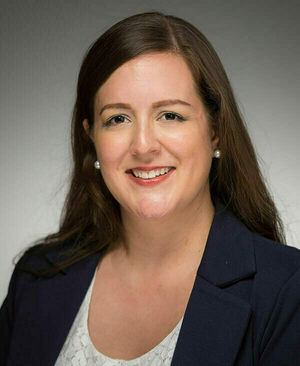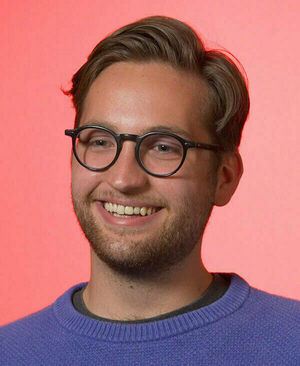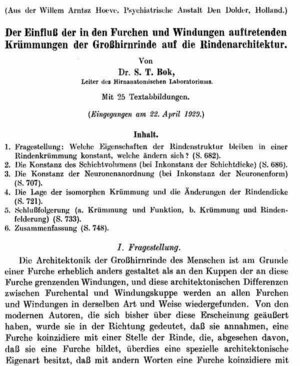German major uses language skills to help Notre Dame engineering professor unlock 93-year-old brain research

In the fields of neuroscience and neuroanatomy, scholars often cite a 93-year-old paper that examines the thickness of cortical folds.
The problem, at least for an English-reading audience, is that this knowledge has always been hiding in plain sight. The article was written in German but never fully translated — until now, thanks to a Notre Dame College of Engineering professor and a Class of 2022 graduate with a deep understanding of the language.
Maria Holland, an assistant professor of aerospace and mechanical engineering, recently bought the rights to the paper, “The Influence of the Curvature Occurring in the Folds and Turns of the Cerebral Cortex on Cortical Architecture,” which is one of the signature works of the Dutch neuroanatomist Siegfried Bok.

“This is an important paper that has influenced a lot of work and could influence more work, but a lot of people weren’t able to read it,” she said.
The 1929 paper assists Holland’s ongoing research, supported by a National Science Foundation grant, to examine the brain’s cortical thickness.The effort could identify evolutionary, developmental, and pathological changes in brain morphology that could inform new ways for early diagnosis and treatment of brain disorders.
The project began in 2019 when Holland asked Notre Dame’s Department of German and Russian Languages and Literatures for recommendations of students who could do translation work. Andrew Fulwider ’22 was on the list, and when Holland noticed he was majoring in German and engineering, she knew he was the ideal candidate.
The translation process was extensive. Fulwider worked through about 100 pages of German text during his sophomore and junior years. The translation sessions spanned a year and more than 100 hours.
“I feel like I’m contributing to the dissemination of knowledge which would otherwise not be disseminated,” said Fulwider, who is now pursuing a master’s degree in sustainable energy supply at RWTH Aachen University in Germany. “These texts weren’t lost, per se, but people didn’t really have access to them. They just had access to what other people said about them.”

As for how he was able to complete the project, Fulwider credits his German-learning experience at Notre Dame.
“I can’t praise Notre Dame’s German program enough. It’s a really well-run department with professors who are deeply invested in the success of their students,” said Fulwider, who earned both a BA in German and BS in engineering through the Reilly dual-degree program. “Without the German program, I wouldn’t have a shot to do this. I wouldn’t have studied German past a high-school level.”
The fact that the project involves the brain and language seems fitting, given that Fulwider has a handle on language to a point that he can now think in German.
“That ability helps you open different pathways in your brain and helps you think in different ways period,” he said. “It definitely helps with mental flexibility.”
With the translation complete, the journal Brain Multiphysics published the English version in November.
“Most scientific publications focus on original research or on many papers published on a single topic. Our paper was neither of those, but I wanted to make it accessible to other researchers,” Holland said. “In the end, I’m just so pleased that we made this nontraditional publication happen.”
Originally published by at al.nd.edu on November 28, 2022.
Latest Research
- ‘A special challenge’: German studies scholar wins National Humanities Center fellowship for research on medieval womenFor CJ Jones, the joy of research is not the answers but the journey. And the next step on that journey is a fellowship with the National Humanities Center. …
- Notre Dame Lead Innovation Team partners with local WIC program to identify, prevent lead poisoning in childrenB.A.B.E. store “shoppers” now have something new to help their families: free lead screening kits offered by the University of Notre Dame’s Lead Innovation Team.
- Notre Dame Welcomes Ninth Cohort of Warrior-Scholars for Transformative Academic JourneyNOTRE DAME, IN – The University of Notre Dame recently concluded its ninth successful Warrior-Scholar Project (WSP) boot camp, hosting 34 dedicated Warrior-Scholars from June 21st to 28th. This intensive, week-long academic residency provided transitioning service members and veterans…
- Entrepreneurship and Empowerment in South Africa study abroad program celebrates 25 yearsThis year, the Entrepreneurship and Empowerment in South Africa (EESA) program marked its 25th year of operation. EESA is a six-week summer study abroad program that enables students to help historically…
- Vatican honors Martin and Carmel Naughton with papal awardCarmel…
- Brain tumor growth patterns may help inform patient care managementAssistant Professor Meenal Datta (University of Notre Dame/Wes Evard) A team of researchers from the University of Notre Dame, Harvard Medical School/Massachusetts General Hospital, and Boston University has developed a technique for measuring a brain tumor’s mechanical force and a new model to estimate how much brain tissue a patient has lost.













